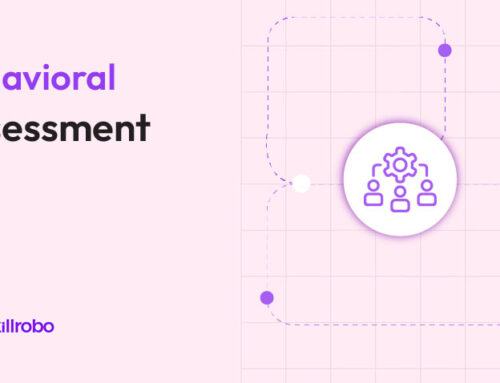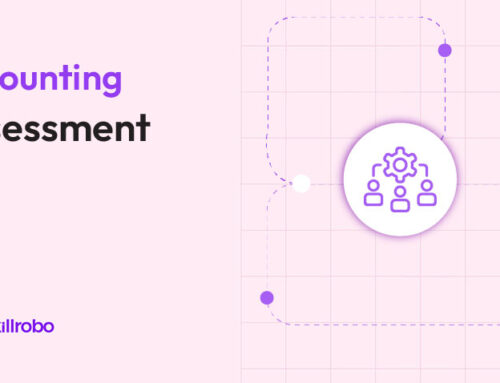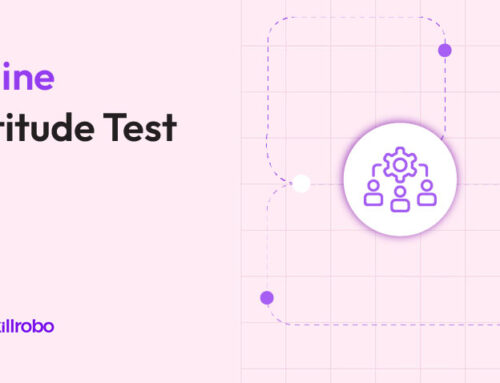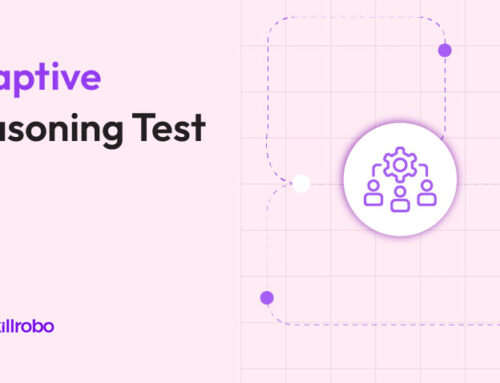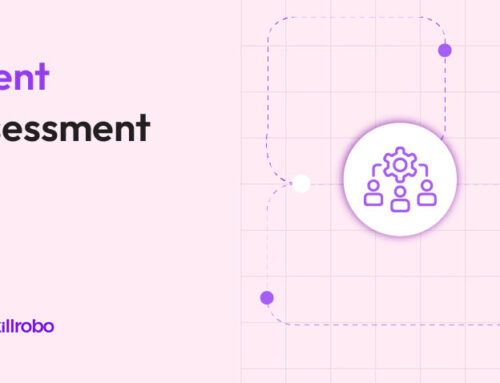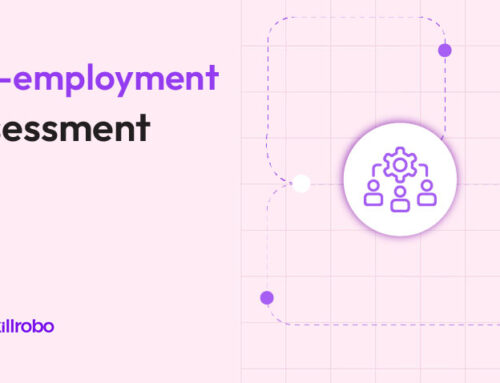Table of Contents
- Key Takeaways
- Why Technical Roles Require Aptitude-Based Evaluation
- What Do Technical Aptitude Tests Typically Measure?
- Types of Technical Aptitude Test Formats
- Benefits of Using Aptitude Tests in Technical Recruitment
- Skillrobo: Technical Assessments Made Simple
- Conclusion: Hire for Ability, Not Assumption
Related articles
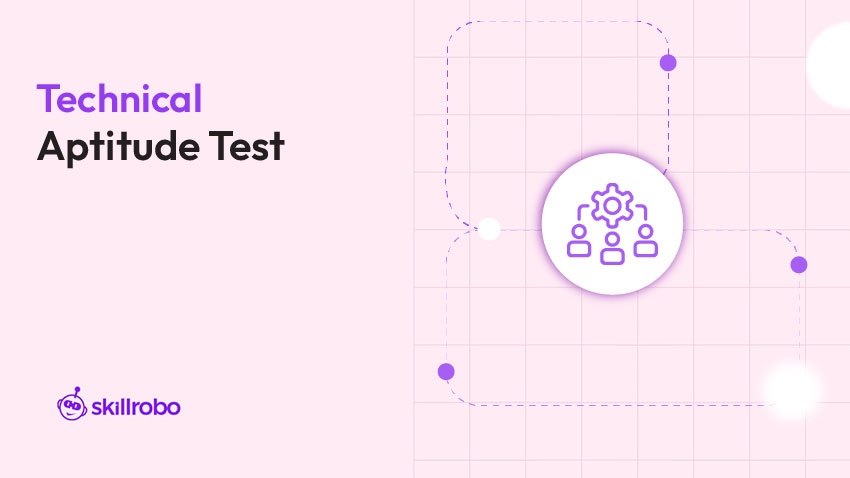
Key Takeaways
- Online aptitude tests assess a candidate’s core competencies in logic, technical knowledge, and problem-solving for technical roles.
- These tests help organizations reduce screening time, improve accuracy, and focus interviews on high-potential candidates.
- Structured technical assessments support objective evaluation, even across complex job roles like development, data analytics, and engineering.
- Skill-based assessments uncover potential beyond resumes and certifications, leading to better hiring outcomes and reduced early attrition.
Why Technical Roles Require Aptitude-Based Evaluation
Technical roles demand precision, analytical thinking, and deep subject expertise. Yet, traditional screening methods like resumes and unstructured interviews often fall short in identifying true job fit. Many candidates may possess credentials but lack the critical thinking or problem-solving mindset required for real-world tasks. Online aptitude tests allow recruiters to evaluate how candidates think, not just what they know. They serve as early predictors of success, revealing how well an applicant applies knowledge under time constraints and changing variables. We explore this in detail in this blog on online aptitude tests for evaluating technical job applicants.
Platforms like Skillrobo help recruiters design technical skill assessment tests that simulate on-the-job challenges, improving hiring accuracy and role alignment. Especially in fields like IT, engineering, and data science, such insights are vital for building high-performing technical teams.
Stat Check: Why Aptitude Testing Matters in Tech Hiring
74% of employers using pre-employment assessments report a more structured hiring process that reduces guesswork and bias.
67% of tech recruiters say that aptitude-based testing improved candidate quality compared to resume-based screening.
What Do Technical Aptitude Tests Typically Measure?
Technical aptitude tests are designed to evaluate real-world, job-relevant capabilities that go far beyond general intelligence. For roles in software development, IT support, cybersecurity, and engineering, these tests offer a practical way to assess how well candidates can apply their technical skills in dynamic scenarios. Here’s a deeper look at the core areas most commonly evaluated:
1. Logical Reasoning
Logical reasoning tests evaluate a candidate’s ability to interpret patterns, solve structured problems, and apply logic in unfamiliar situations. This is crucial for software developers and QA engineers, who must write and debug code daily. These questions often involve pattern recognition, conditional logic, or flowchart interpretation.
In platforms like Skillrobo, logical reasoning questions can be embedded as part of automated technical skill assessments, ensuring candidates are tested in a consistent and unbiased manner early in the hiring process.
2. Numerical Analysis
From budget forecasting to system performance metrics, technical professionals often work with data. Numerical reasoning tests assess a candidate’s ability to read tables, interpret graphs, and apply quantitative logic to solve problems. These are especially useful for data analysts, fintech engineers, and roles involving automation or algorithm optimization.
3. Domain-Specific Skills
These tests are tailored to the unique requirements of a role. For instance:
- Backend developers may be tested on database queries or API structure.
- Network engineers might be evaluated on IP configurations and routing logic.
- IT support specialists can be tested on hardware troubleshooting or ticket resolution protocols.
Using Skillrobo, recruiters can design a pre-employment skill assessment test that includes job-specific technical topics, ensuring the test mirrors actual on-the-job responsibilities.
4. Critical Thinking
This measures a candidate’s ability to analyze situations logically, weigh options, and decide under pressure. In technical environments, this is crucial for roles like DevOps, cloud architecture, or cybersecurity, where decisions affect infrastructure and security. Typical questions may simulate an outage, security breach, or deployment dilemma, and assess how the candidate would respond.
5. Tech-Adaptability Scenarios
Technology doesn’t stand still—tools change, systems evolve, and environments shift. This portion of the test simulates real-world challenges such as system migration, unexpected software bugs, or tool mismatches. The goal is to understand how candidates approach learning and problem-solving when faced with new technology or constraints.
This adaptability is particularly important in agile environments where tools like Kubernetes, Terraform, or CI/CD pipelines are updated frequently, and team members are expected to keep pace.
Types of Technical Aptitude Test Formats
Depending on the role, companies can deploy various test formats to gauge cognitive and technical capabilities:
| Format | Description |
|---|---|
| Multiple-Choice Questions | Ideal for assessing conceptual understanding across networking, programming, or system design. |
| Fill-in-the-Blanks | Useful for syntax validation in scripting or completing logic-based equations. |
| Code Simulations | Hands-on exercises that test the ability to write, debug, and optimize real code snippets. |
| Diagram-Based Questions | Evaluate architecture design, flowchart interpretation, or network topology analysis. |
| Short Descriptive Tasks | Require explaining technical processes, decision logic, or troubleshooting steps concisely. |
Benefits of Using Aptitude Tests in Technical Recruitment
In technical hiring, making the right decisions quickly can mean the difference between onboarding high-performing engineers and dealing with poor hires that delay innovation. Integrating aptitude assessments into the recruitment process offers measurable advantages—both operationally and strategically. Here’s how:
1. Faster Pre-Screening
When dealing with large applicant pools, resume screening and manual reviews can slow down your time-to-hire. Aptitude tests automate this phase, helping recruiters identify top candidates based on actual skill performance rather than keywords. With role-based questions that align with the job description, automated testing platforms like Skillrobo enable recruiters to filter candidates based on specific technical capabilities early in the funnel, saving time and effort while increasing precision.
2. Data-Driven Decision Making
Aptitude test scores offer concrete, objective data, giving hiring managers insights into logical thinking, coding efficiency, and problem-solving speed. Rather than relying on instinct or inconsistent interview responses, teams can compare candidates based on standardized performance metrics. This allows for fairer evaluations and better alignment between candidate capabilities and role demands.
3. Consistency Across Roles
Technical hiring often involves distributed teams or multi-location coordination. Aptitude tests ensure every candidate, regardless of geography, is evaluated using the same standards. This creates a level playing field and promotes uniform hiring quality across departments or business units. It also simplifies collaboration between recruiters and technical leads during the selection process.
4. Better Job Fit and Retention
Candidates hired through skill-based evaluations tend to perform better, adapt faster, and stay longer. Because aptitude tests reveal how individuals think and respond in job-simulated conditions, organizations are more likely to match the right person with the right technical challenge. This alignment reduces onboarding friction, improves early-stage productivity, and minimizes attrition within the first year.
Skillrobo: Technical Assessments Made Simple
Skillrobo is an online pre-employment assessment platform that enables organizations to evaluate technical talent through customizable, real-world tests. From logic and coding simulations to role-specific aptitude assessments, Skillrobo helps recruiters move beyond resumes and hire based on actual ability.
Built-in features like cheating prevention, instant reporting, and AI-generated question libraries make Skillrobo a reliable tool for tech hiring. Whether hiring for IT support, full-stack developers, or QA engineers, you can tailor assessments to suit every technical role, ensuring faster, more confident decision-making.
Conclusion: Hire for Ability, Not Assumption
In technical hiring, aptitude is often the missing link between potential and performance. By adopting online aptitude tests, organizations can streamline evaluation, reduce hiring risks, and identify candidates with both knowledge and problem-solving capacity. Rather than relying solely on credentials, these tests provide a performance-based snapshot of who’s ready to take on complex technical challenges.
Sign up for Skillrobo to start building customized assessments that match your technical job requirements and hiring goals.

Key Takeaways
- Online aptitude tests assess a candidate’s core competencies in logic, technical knowledge, and problem-solving for technical roles.
- These tests help organizations reduce screening time, improve accuracy, and focus interviews on high-potential candidates.
- Structured technical assessments support objective evaluation, even across complex job roles like development, data analytics, and engineering.
- Skill-based assessments uncover potential beyond resumes and certifications, leading to better hiring outcomes and reduced early attrition.
Why Technical Roles Require Aptitude-Based Evaluation
Technical roles demand precision, analytical thinking, and deep subject expertise. Yet, traditional screening methods like resumes and unstructured interviews often fall short in identifying true job fit. Many candidates may possess credentials but lack the critical thinking or problem-solving mindset required for real-world tasks. Online aptitude tests allow recruiters to evaluate how candidates think, not just what they know. They serve as early predictors of success, revealing how well an applicant applies knowledge under time constraints and changing variables. We explore this in detail in this blog on online aptitude tests for evaluating technical job applicants.
Platforms like Skillrobo help recruiters design technical skill assessment tests that simulate on-the-job challenges, improving hiring accuracy and role alignment. Especially in fields like IT, engineering, and data science, such insights are vital for building high-performing technical teams.
Stat Check: Why Aptitude Testing Matters in Tech Hiring
74% of employers using pre-employment assessments report a more structured hiring process that reduces guesswork and bias.
67% of tech recruiters say that aptitude-based testing improved candidate quality compared to resume-based screening.
What Do Technical Aptitude Tests Typically Measure?
Technical aptitude tests are designed to evaluate real-world, job-relevant capabilities that go far beyond general intelligence. For roles in software development, IT support, cybersecurity, and engineering, these tests offer a practical way to assess how well candidates can apply their technical skills in dynamic scenarios. Here’s a deeper look at the core areas most commonly evaluated:
1. Logical Reasoning
Logical reasoning tests evaluate a candidate’s ability to interpret patterns, solve structured problems, and apply logic in unfamiliar situations. This is crucial for software developers and QA engineers, who must write and debug code daily. These questions often involve pattern recognition, conditional logic, or flowchart interpretation.
In platforms like Skillrobo, logical reasoning questions can be embedded as part of automated technical skill assessments, ensuring candidates are tested in a consistent and unbiased manner early in the hiring process.
2. Numerical Analysis
From budget forecasting to system performance metrics, technical professionals often work with data. Numerical reasoning tests assess a candidate’s ability to read tables, interpret graphs, and apply quantitative logic to solve problems. These are especially useful for data analysts, fintech engineers, and roles involving automation or algorithm optimization.
3. Domain-Specific Skills
These tests are tailored to the unique requirements of a role. For instance:
- Backend developers may be tested on database queries or API structure.
- Network engineers might be evaluated on IP configurations and routing logic.
- IT support specialists can be tested on hardware troubleshooting or ticket resolution protocols.
Using Skillrobo, recruiters can design a pre-employment skill assessment test that includes job-specific technical topics, ensuring the test mirrors actual on-the-job responsibilities.
4. Critical Thinking
This measures a candidate’s ability to analyze situations logically, weigh options, and decide under pressure. In technical environments, this is crucial for roles like DevOps, cloud architecture, or cybersecurity, where decisions affect infrastructure and security. Typical questions may simulate an outage, security breach, or deployment dilemma, and assess how the candidate would respond.
5. Tech-Adaptability Scenarios
Technology doesn’t stand still—tools change, systems evolve, and environments shift. This portion of the test simulates real-world challenges such as system migration, unexpected software bugs, or tool mismatches. The goal is to understand how candidates approach learning and problem-solving when faced with new technology or constraints.
This adaptability is particularly important in agile environments where tools like Kubernetes, Terraform, or CI/CD pipelines are updated frequently, and team members are expected to keep pace.
Types of Technical Aptitude Test Formats
Depending on the role, companies can deploy various test formats to gauge cognitive and technical capabilities:
| Format | Description |
|---|---|
| Multiple-Choice Questions | Ideal for assessing conceptual understanding across networking, programming, or system design. |
| Fill-in-the-Blanks | Useful for syntax validation in scripting or completing logic-based equations. |
| Code Simulations | Hands-on exercises that test the ability to write, debug, and optimize real code snippets. |
| Diagram-Based Questions | Evaluate architecture design, flowchart interpretation, or network topology analysis. |
| Short Descriptive Tasks | Require explaining technical processes, decision logic, or troubleshooting steps concisely. |
Benefits of Using Aptitude Tests in Technical Recruitment
In technical hiring, making the right decisions quickly can mean the difference between onboarding high-performing engineers and dealing with poor hires that delay innovation. Integrating aptitude assessments into the recruitment process offers measurable advantages—both operationally and strategically. Here’s how:
1. Faster Pre-Screening
When dealing with large applicant pools, resume screening and manual reviews can slow down your time-to-hire. Aptitude tests automate this phase, helping recruiters identify top candidates based on actual skill performance rather than keywords. With role-based questions that align with the job description, automated testing platforms like Skillrobo enable recruiters to filter candidates based on specific technical capabilities early in the funnel, saving time and effort while increasing precision.
2. Data-Driven Decision Making
Aptitude test scores offer concrete, objective data, giving hiring managers insights into logical thinking, coding efficiency, and problem-solving speed. Rather than relying on instinct or inconsistent interview responses, teams can compare candidates based on standardized performance metrics. This allows for fairer evaluations and better alignment between candidate capabilities and role demands.
3. Consistency Across Roles
Technical hiring often involves distributed teams or multi-location coordination. Aptitude tests ensure every candidate, regardless of geography, is evaluated using the same standards. This creates a level playing field and promotes uniform hiring quality across departments or business units. It also simplifies collaboration between recruiters and technical leads during the selection process.
4. Better Job Fit and Retention
Candidates hired through skill-based evaluations tend to perform better, adapt faster, and stay longer. Because aptitude tests reveal how individuals think and respond in job-simulated conditions, organizations are more likely to match the right person with the right technical challenge. This alignment reduces onboarding friction, improves early-stage productivity, and minimizes attrition within the first year.
Skillrobo: Technical Assessments Made Simple
Skillrobo is an online pre-employment assessment platform that enables organizations to evaluate technical talent through customizable, real-world tests. From logic and coding simulations to role-specific aptitude assessments, Skillrobo helps recruiters move beyond resumes and hire based on actual ability.
Built-in features like cheating prevention, instant reporting, and AI-generated question libraries make Skillrobo a reliable tool for tech hiring. Whether hiring for IT support, full-stack developers, or QA engineers, you can tailor assessments to suit every technical role, ensuring faster, more confident decision-making.
Conclusion: Hire for Ability, Not Assumption
In technical hiring, aptitude is often the missing link between potential and performance. By adopting online aptitude tests, organizations can streamline evaluation, reduce hiring risks, and identify candidates with both knowledge and problem-solving capacity. Rather than relying solely on credentials, these tests provide a performance-based snapshot of who’s ready to take on complex technical challenges.
Sign up for Skillrobo to start building customized assessments that match your technical job requirements and hiring goals.




